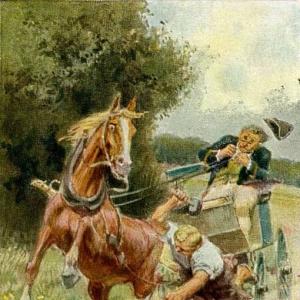Reading time: 10 min
There was a great war, and the King had many soldiers, but gave them small pay, so small that they could not live upon it, so three of them agreed among themselves to desert. One of them said to the others, „If we are caught we shall be hanged on the gallows; how shall we manage it?“ Another said, „Look at that great cornfield, if we were to hide ourselves there, no one could find us. The troops are not allowed to enter it, and to-morrow they are to march away.“ They crept into the corn, only the troops did not march away, but remained lying all round about it. They stayed in the corn for two days and two nights, and were so hungry that they all but died, but if they had come out, their death would have been certain. Then said they, „What is the use of our deserting if we have to perish miserably here?“ But now a fiery dragon came flying through the air, and it came down to them, and asked why they had concealed themselves there? They answered, „We are three soldiers who have deserted because the pay was so bad, and now we shall have to die of hunger if we stay here, or to dangle on the gallows if we go out.“ – „If you will serve me for seven years,“ said the dragon, „I will convey you through the army so that no one shall seize you.“ – „We have no choice and are compelled to accept,“ they replied. Then the dragon caught hold of them with his claws, and carried them away through the air over the army, and put them down again on the earth far from it; but the dragon was no other than the Devil. He gave them a small whip and said, „Whip with it and crack it, and then as much gold will spring up round about as you can wish for. Then you can live like great lords, keep horses, and drive your carriages, but when the seven years have come to an end, you are my property.“ Then he put before them a book which they were all three forced to sign. „I will, however, then set you a riddle,“ said he, „and if you can guess that, you shall be free, and released from my power.“ Then the dragon flew away from them, and they went away with their whip, had gold in plenty, ordered themselves rich apparel, and travelled about the world. Wherever they were they lived in pleasure and magnificence, rode on horseback, drove in carriages, ate and drank, but did nothing wicked. The time slipped quickly away, and when the seven years were coming to an end, two of them were terribly anxious and alarmed; but the third took the affair easily, and said, „Brothers, fear nothing, my head is sharp enough, I shall guess the riddle.“ They went out into the open country and sat down, and the two pulled sorrowful faces. Then an aged woman came up to them who inquired why they were so sad? „Alas!“ said they, „how can that concern you? After all, you cannot help us.“ – „Who knows?“ said she. „confide your trouble to me.“ So they told her that they had been the Devil’s servants for nearly seven years, and that he had provided them with gold as plentifully as if it had been blackberries, but that they had sold themselves to him, and were forfeited to him, if at the end of the seven years they could not guess a riddle.“ The old woman said, „If you are to be saved, one of you must go into the forest, there he will come to a fallen rock which looks like a little house, he must enter that, and then he will obtain help.“ The two melancholy ones thought to themselves, „That will still not save us,“ and stayed where they were, but the third, the merry one, got up and walked on in the forest until he found the rock-house. In the little house, however, a very aged woman was sitting, who was the Devil’s grandmother, and asked the soldier where he came from, and what he wanted there? He told her everything that had happened, and as he pleased her well, she had pity on him, and said she would help him. She lifted up a great stone which lay above a cellar, and said, „Conceal thyself there, thou canst hear everything that is said here; only sit still, and do not stir. When the dragon comes, I will question him about the riddle, he tells everything to me, so listen carefully to his answer.“ At twelve o’clock at night, the dragon came flying thither, and asked for his dinner. The grandmother laid the table, and served up food and drink, so that he was pleased, and they ate and drank together. In the course of conversation, she asked him what kind of a day he had had, and how many souls he had got? „Nothing went very well today,“ he answered, „but I have laid hold of three soldiers, I have them safe.“ – „Indeed! three soldiers, that’s something like, but they may escape you yet.“ The Devil said mockingly, „They are mine! I will set them a riddle, which they will never in this world be able to guess!“ – „What riddle is that?“ she inquired. „I will tell you. In the great North Sea lies a dead dog-fish, that shall be your roast meat, and the rib of a whale shall be your silver spoon, and a hollow old horse’s hoof shall be your wine-glass.“ When the Devil had gone to bed, the old grandmother raised up the stone, and let out the soldier. „Hast thou paid particular attention to everything?“ – „Yes,“ said he, „I know enough, and will contrive to save myself.“ Then he had to go back another way, through the window, secretly and with all speed to his companions. He told them how the Devil had been overreached by the old grandmother, and how he had learned the answer to the riddle from him. Then they were all joyous, and of good cheer, and took the whip and whipped so much gold for themselves that it ran all over the ground. When the seven years had fully gone by, the Devil came with the book, showed the signatures, and said, „I will take you with me to hell. There you shall have a meal! If you can guess what kind of roast meat you will have to eat, you shall be free and released from your bargain, and may keep the whip as well.“ Then the first soldier began and said, „In the great North Sea lies a dead dog-fish, that no doubt is the roast meat.“ The Devil was angry, and began to mutter, „Hm! hm! hm!“ And asked the second, „But what will your spoon be?“ – „The rib of a whale, that is to be our silver spoon.“ The Devil made a wry face, again growled, „Hm! hm! hm!“ and said to the third, „And do you also know what your wine-glass is to be?“ – „An old horse’s hoof is to be our wineglass.“ Then the Devil flew away with a loud cry, and had no more power over them, but the three kept the whip, whipped as much money for themselves with it as they wanted, and lived happily to their end.
 Learn languages. Double-tap on a word.Learn languages in context with Childstories.org and Deepl.com.
Learn languages. Double-tap on a word.Learn languages in context with Childstories.org and Deepl.com.Backgrounds
Interpretations
Adaptions
Summary
Linguistics
„The Devil and His Grandmother“ is a German fairy tale collected by the Brothers Grimm, Jacob and Wilhelm, who were linguists, cultural researchers, and authors. Their collection of fairy tales, known as „Grimm’s Fairy Tales“ or „Children’s and Household Tales“ (in German, „Kinder- und Hausmärchen“), was first published in 1812 and has been an essential part of the Western literary canon since then. The collection, which includes 210 stories, has been translated into multiple languages and adapted into various forms of media, such as theater, film, and television.
The Brothers Grimm were part of the larger Romantic movement in the early 19th century, which focused on folklore, mythology, and the importance of nature and emotions. The fairy tales they collected were primarily derived from oral storytelling traditions, which they sought to preserve and document. Many of these stories had been passed down through generations and were deeply rooted in European folklore.
While „The Devil and His Grandmother“ might not be as well-known as other Grimm’s fairy tales like „Cinderella“ or „Snow White,“ it shares common themes and motifs with other stories in the collection, such as deals with supernatural beings, cunning protagonists, and the importance of resourcefulness in overcoming adversity. The story also demonstrates the influence of Christianity in European folklore, as the Devil is a recurring figure in many tales.
„The Devil and His Grandmother“ is a story that can be interpreted in various ways, reflecting themes such as the consequences of greed, the importance of wit and cunning, and the power of help from unexpected sources. Here are three possible interpretations:
The consequences of greed: The soldiers initially desert the army because they are unhappy with their low pay. They enter into a dangerous pact with the Devil for the promise of wealth and luxury. While they manage to escape the Devil’s clutches in the end, the story serves as a cautionary tale about the risks associated with the pursuit of material wealth at any cost.
The importance of wit and cunning: The third soldier’s confidence and cleverness play a crucial role in the story. His ability to seek help and pay attention to the Devil’s conversation with his grandmother enables him and his comrades to escape their contract with the Devil. This interpretation highlights the importance of using one’s intelligence and resourcefulness to overcome challenging situations and outwit adversaries.
The power of help from unexpected sources: The Devil’s grandmother and the old woman who directs the third soldier to her are essential to the soldiers‘ salvation. Both characters, who might initially be seen as unimportant or even dangerous, prove to be valuable allies. This interpretation emphasizes the idea that help can come from unexpected places and that it is important to remain open to receiving assistance from others, even if they may not appear to be powerful or significant at first glance.
„The Devil and His Grandmother“ is a classic fairy tale that has been adapted in various forms over the years. Here are a few examples.
Operas: There have been several operas based on the tale, including „Der Freischütz“ by Carl Maria von Weber, which features a version of the story in Act III.
Films: The story has been adapted into several films, including the 1922 silent film „Der Brennende Acker“ (The Burning Soil), which features a version of the tale, and the 1964 Czech film „The Devil’s Trap,“ which is based on the story.
Literature: The tale has been adapted into several works of literature, including the novel „The Devil’s Elixirs“ by E.T.A. Hoffmann, which features a version of the story, and the short story „The Devil’s Grandmother“ by Ursula K. Le Guin, which reimagines the tale in a modern setting.
Television: The tale has been adapted into several episodes of television shows, including the German series „Tatort“ and the American series „Grimm.“
Art: The tale has inspired several works of art, including the painting „The Devil and His Grandmother“ by Johann Heinrich Ramberg and the sculpture „The Devil and His Grandmother“ by Alfred Kubin.
Overall, „The Devil and His Grandmother“ is a timeless tale that continues to inspire artists and creators in various forms of media.
„The Devil and His Grandmother“ is a fairy tale by the Brothers Grimm about three soldiers who desert the army due to low pay. They hide in a cornfield to avoid capture and eventually encounter a fiery dragon, who is actually the Devil. The Devil offers to help them escape in exchange for their service for seven years, during which they will have abundant gold. The soldiers agree and sign a contract, but the Devil adds that at the end of the seven years, they must solve a riddle to gain their freedom.
The soldiers live lavishly for seven years, but as the end of the term approaches, two of them become anxious about the riddle. The third soldier, however, remains confident and meets an old woman who directs him to a fallen rock that resembles a house. There, he finds the Devil’s grandmother, who takes pity on him and helps him learn the answer to the riddle. She hides him in a cellar and instructs him to listen carefully to the conversation between her and the Devil, who reveals the answer to the riddle.
Armed with the answer, the third soldier returns to his comrades and shares the information. When the Devil arrives to collect their souls, the soldiers correctly answer the riddle, saying that their roast meat will be a dead dog-fish from the North Sea, their spoon will be the rib of a whale, and their wine-glass will be an old horse’s hoof. Enraged, the Devil loses his power over the soldiers, who keep the magical whip, continue to generate gold, and live happily ever after.
The fairy tale „The Devil and His Grandmother“ by the Brothers Grimm is rich with linguistic and thematic elements that can be analyzed to better understand its narrative structure, themes, and cultural context.
Structure and Syntax: The tale employs a straightforward narrative style typical of oral storytelling traditions. Sentences are often compound and complex, with a clear chronological progression of events. Repetition is used as a narrative device, evident in the repetition of phrases and the structure of dialogue, which serves to reinforce key points and facilitate memorization in oral cultures.
Dialogue: Dialogue is used to reveal character motivations and advance the plot. For example, the soldiers‘ initial conversation about deserting reveals their desperation and lack of options. The Devil’s speech is direct and commanding, illustrating his authoritative and manipulative nature.
Lexical Choices: The vocabulary is simple and accessible, which aids in the tale’s transmission and comprehension across different audiences. Use of figurative language, such as metaphors and similes (e. g. , „gold as plentifully as if it had been blackberries“), enriches the narrative and adds vivid imagery.
Symbolism and Metaphor: The tale is rich with symbols, such as the whip that produces gold, representing power and wealth. The whip symbolizes the magical aid but also the Faustian bargain of the soldiers with the Devil. The riddle elements (dead dog-fish, rib of a whale, horse’s hoof) symbolize seemingly impossible challenges that must be overcome through wit, reflecting the common fairy tale trope of cleverness triumphing over evil.
Thematic Analysis
Themes of Temptation and Bargaining: The tale explores the theme of making deals with malevolent forces to satisfy immediate needs, highlighting human susceptibility to temptation when in dire circumstances. The moral implication of bargaining with the devil reflects cautionary themes about short-term gains and long-term consequences.
Cunning and Intelligence: The soldiers‘ successful evasion of their fate demonstrates the value placed on intelligence and cunning over brute force or straightforward bravery. The role of the grandmother as a helper figure emphasizes wisdom and the importance of seeking help and guidance.
Good vs. Evil: The story contains clear dichotomies of good versus evil, common in fairy tales, with the Devil representing ultimate evil and the grandmother symbolizing benevolent aid. The eventual defeat of the Devil suggests a moral that good can triumph over evil through cleverness and the aid of wise allies.
Socioeconomic Commentary: The soldiers’ desertion due to inadequate pay hints at socio-economic issues and class struggles, subtly critiquing the treatment of soldiers and the conditions that lead to moral compromises.
Freedom and Redemption: The promise of freedom upon solving the riddle suggests themes of redemption and liberation. The soldiers‘ eventual success and escape from their bargain illustrate the possibility of overcoming dire situations through perseverance and cleverness.
In summary, „The Devil and His Grandmother“ uses simple language rich with symbolism to deliver complex themes of temptation, intelligence, and the dichotomy of good versus evil, while reflecting cultural and socio-economic concerns of its time.
Information for scientific analysis
Fairy tale statistics | Value |
|---|---|
| Number | KHM 125 |
| Aarne-Thompson-Uther-Index | ATU Typ 812 |
| Translations | DE, EN, DA, ES, FR, PT, IT, JA, NL, PL, RU, TR, VI, ZH |
| Readability Index by Björnsson | 27.4 |
| Flesch-Reading-Ease Index | 83 |
| Flesch–Kincaid Grade-Level | 6.3 |
| Gunning Fog Index | 9.2 |
| Coleman–Liau Index | 7.6 |
| SMOG Index | 8.4 |
| Automated Readability Index | 6.7 |
| Character Count | 6.538 |
| Letter Count | 4.985 |
| Sentence Count | 67 |
| Word Count | 1.254 |
| Average Words per Sentence | 18,72 |
| Words with more than 6 letters | 109 |
| Percentage of long words | 8.7% |
| Number of Syllables | 1.554 |
| Average Syllables per Word | 1,24 |
| Words with three Syllables | 54 |
| Percentage Words with three Syllables | 4.3% |

 Facebook
Facebook  Whatsapp
Whatsapp  Messenger
Messenger  Telegram
Telegram Reddit
Reddit













